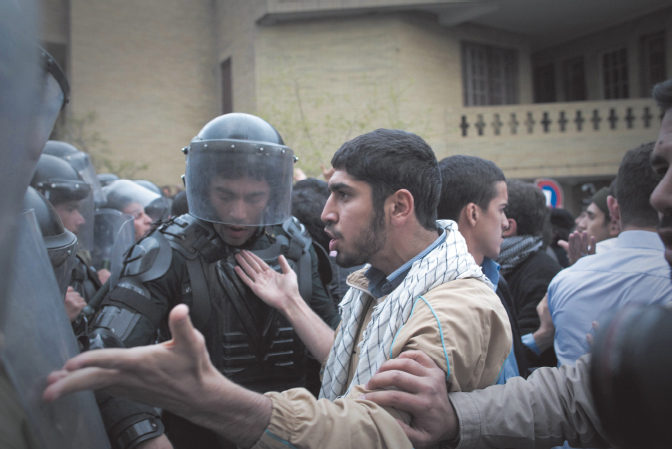8.2.1 What is Conflict?
Printed Page 245
What is Conflict?
Almost any issue can spark conflict—money, time, sex, religion, politics, love, chores, and so on—and almost anyone can get into a conflict: family members, friends, lovers, coworkers, or casual acquaintances. Despite such variations, all conflicts share similar attributes. Conflict is the process that occurs when people perceive that they have incompatible goals or that someone is interfering in their ability to achieve their objectives (Wilmot & Hocker, 2010). Four features characterize most conflicts: they begin with perception, they involve clashes in goals or behaviors, they unfold over time as a process, and they are dynamic.

Conflict Begins with Perception Conflict occurs when people perceive incompatible goals or actions (Roloff & Soule, 2002). Because conflict begins with perception, perceptual errors (see Chapter 3) shape how our conflicts unfold. As we’ll discuss later in this chapter, during conflicts we blame others more than ourselves, and perceive them as uncooperative and ourselves as helpful. These self-enhancing errors can lead us to manage conflict in ways that create unsatisfying outcomes.
Conflict Involves Clashes in Goals or Behaviors At the heart of conflicts are clashes in goals or behaviors (Zacchilli, Hendrick, & Hendrick, 2009). Some conflicts revolve around incompatible goals, ranging from everyday leisure activity disputes (“I want to go out dancing!” vs. “I want to stay home and play video games!”) to serious arguments regarding personal values (“I want our children to be raised Jewish!” vs. “I want them to be Catholic!”). Other disputes break out when one person’s actions clash with another’s. A friend texts you repeatedly while you’re studying, and you fire back a nasty message, or your manager demands that you work over a holiday weekend, and you refuse.
Conflict Is a Process Although people often describe conflict as a series of unrelated events (“I sent her this carefully worded e-mail, and for no reason, she blasted me in response!”), conflict is a process that unfolds over time. Its course is determined by the communication choices we make—everything we say and do during a conflict influences everything our partner says and does, and vice versa.
Moreover, most conflicts proceed through several stages, each involving decisions and actions that affect the conflict’s direction and consequences for the individuals involved. In its most basic form, the process of conflict involves people perceiving that a conflict exists, choosing an approach for how to handle the conflict, and then dealing with the conflict resolutions and outcomes that follow. Conflict is not a one-time-only event: how you handle a conflict with someone will have consequences for your future interactions and relationship with that person.
Conflict Is Dynamic Because conflict typically unfolds over a series of exchanged messages, it is ever-changing and unpredictable. Research looking at the dynamic nature of conflict finds that in 66.4 percent of disputes, the focus shifts substantially as the conflict progresses (Keck & Samp, 2007). A fight over your father’s snide remark regarding your job quickly becomes a battle about his chronic disapproval of you. Or, a dispute regarding your roommate eating your leftovers becomes an argument about her failure to be a supportive friend. When a conflict shifts topic, it can devolve into kitchen-sinking (from the expression, “throwing everything at them but the kitchen sink”), in which combatants hurl insults and accusations at each other that have little to do with the original disagreement. For example, a couple fighting over whether one of them was flirting with their server at dinner may say things like: “What about the time when you completely forgot our anniversary?!” and “Oh yeah?! Well, your family sucks!”
Since conflict often dynamically branches out into other troublesome topics, managing conflict is extremely challenging—you can never fully anticipate the twists and turns that will occur. But remember: you have total control over what you say and do—and that can influence how someone responds. If you think a conflict is getting completely off-track, choose your communication carefully to help bring it back on topic.